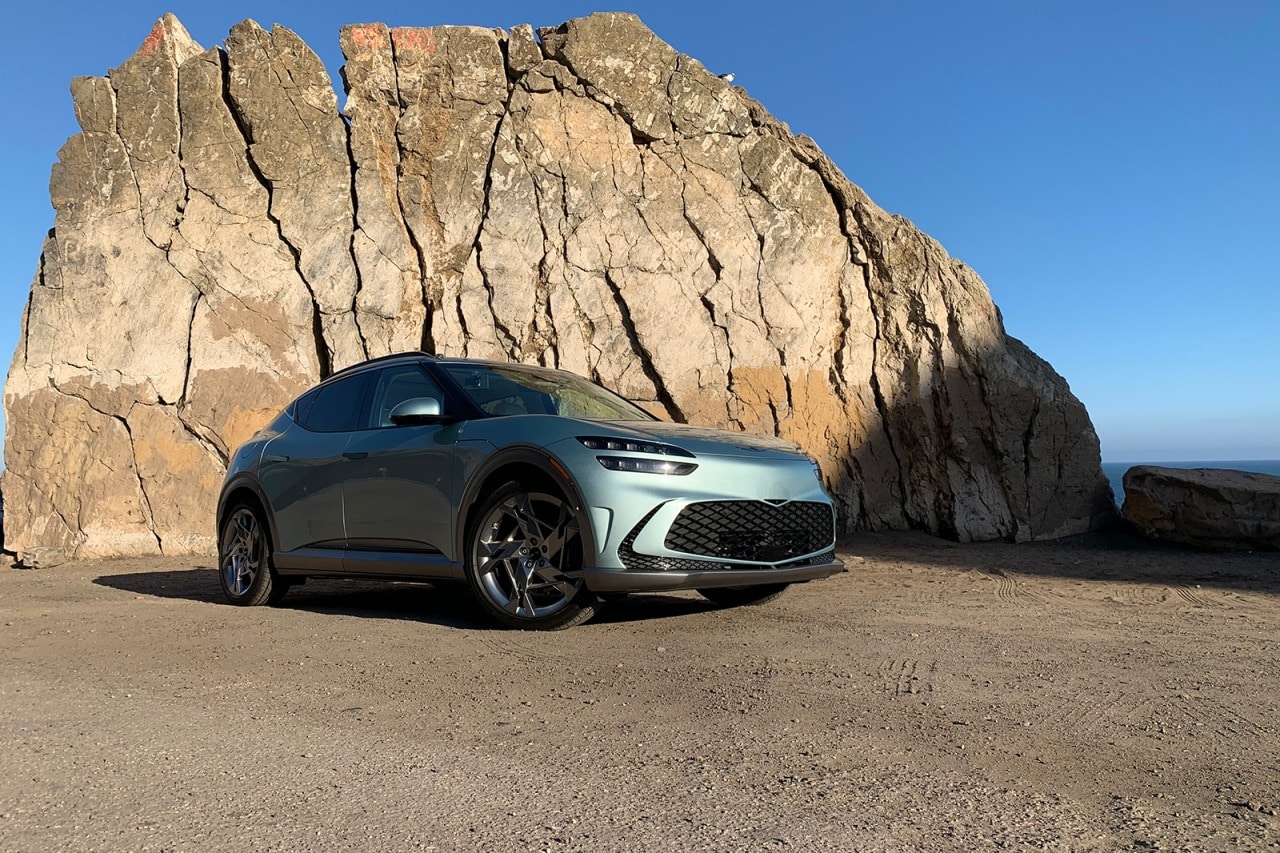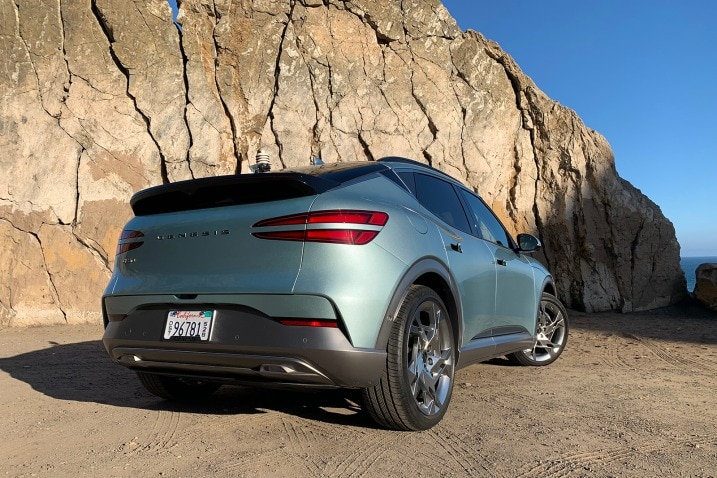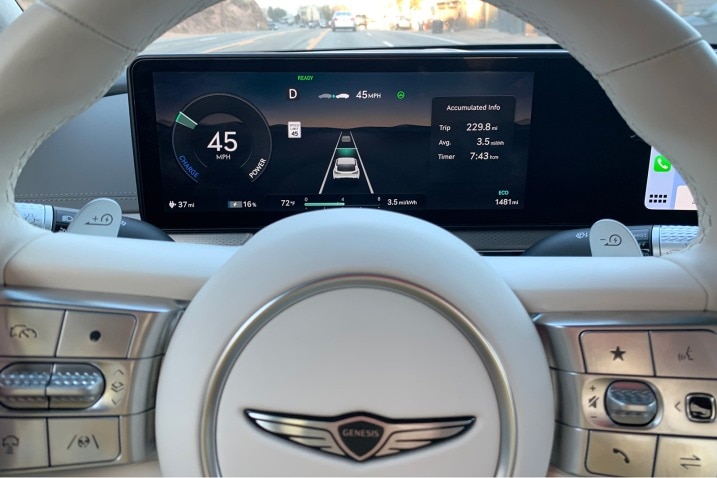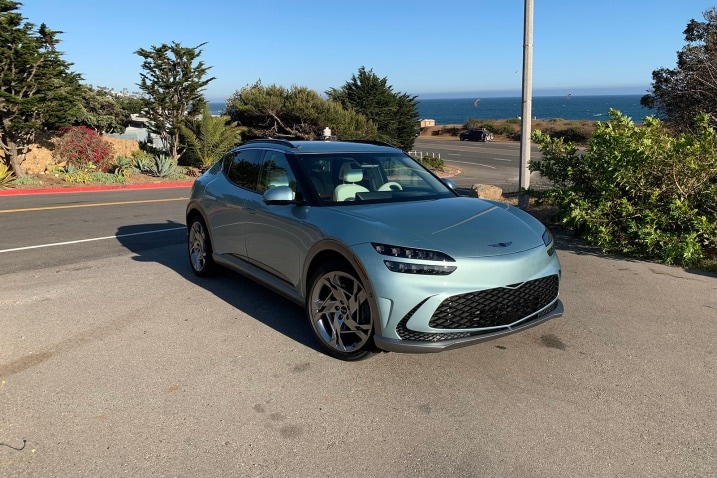- The 2023 Genesis GV60 Performance beat its EPA range by 39 miles in Edmunds' real-world EV range test.
- Based on our real-world testing, the GV60 is virtually as efficient as our long-term Tesla Model Y Performance and has marginally more range, which is the opposite of what the EPA numbers predict.
- The GV60 is one of the few EVs to employ 800-volt architecture, which allows for super-quick charge times.
EV RANGE TEST: 2023 Genesis GV60 Can Go the Distance
We knew the GV60 Performance would be quick, but we didn't think it'd go this far
Genesis has just entered the luxury EV game with its first-ever electric SUV, the 2023 GV60. The GV60 shares its Electric Global Modular Platform (E-GMP) with its corporate cousins, the Kia EV6 and Hyundai Ioniq 5, as well as upcoming models like the Hyundai Ioniq 6 sedan. When they say "Modular," they mean it — this platform will underpin all sorts of Korean EVs in the near future. But the GV60 is certainly a significant member of the family, being the fanciest of the bunch and the most obvious rival to luxury offerings from Tesla and others.
There are two versions of the GV60: Advanced and Performance. Both feature dual electric motors for all-wheel-drive traction, an advanced 800-volt architecture (enabling ultra-fast charging) and a sizable 77.4-kilowatt-hour battery pack. The version we tested here is the Performance, which is rated at a hefty 429 horsepower and 516 lb-ft of torque. In case that's not enough, the GV60 Performance has a button-activated Boost mode that temporarily bumps peak power up to 483 horsepower for about 10 seconds.
But enough about performance; you're here for range and so are we. The EPA projects a maximum range of 235 miles for the Performance, a rather paltry number compared to the Kia EV6 GT-Line (274 miles) and the dual-motor Hyundai Ioniq 5 (256 miles), although the Genesis does deliver by far the most power of the three. More concerningly, that 235-mile figure isn't even in the same ZIP code as the 2022 Tesla Model Y Performance with its 303-mile EPA estimate.
How does this all play out in real-world driving? Let's find out.
Am I Ready for an EV?
- EV ownership works best if you can charge at home (240V outlet) This typically means a 240V home installation, or other places your car is parked for several hours each day. Don't expect a regular household outlet (120V) to suffice.
- Adding a home charging system is estimated to cost $1,616 in This is an estimate for your area. Using your address and the answers you provide, Treehouse can provide a more accurate price.
- Edmunds is partnering with Treehouse, an independent provider of home EV installation services. Learn more Edmunds customers receive a 10% installation discount and 4% smart charger discount. Discount excludes permit, hosted inspection, and load management devices. Valid for 30 days.
Testing the GV60 in the real world
Edmunds tests every new electric vehicle on the same real-world driving loop to see just how far it can travel from a full charge down to zero miles remaining. If you scroll through our EV range leaderboard, you'll see that most EVs have matched or exceeded their EPA range estimates in our testing. Much of that has to do with our ability to test in near-ideal conditions year-round.
Our top-of-the-line GV60 Performance test car naturally came fully loaded, since Genesis typically offers few if any à la carte options. So what do you get over the base GV60 Advanced? The big ticket items include a more powerful front motor (160 kilowatts versus 74 kilowatts, amounting to about 115 more horsepower), larger brakes and wheels, an electronically controlled suspension and mechanical limited-slip differential, as well as a few creature comfort items like ventilated front seats. By the Genesis spec sheet, the Performance model adds anywhere from 120 to 175 pounds.
Not surprisingly, given all that extra kit, it also loses 13 miles of range compared to the base Advanced trim, which is EPA-rated at 248 miles.
One thing that surprised us about the Performance model was that its larger 21-inch wheels weren't any wider than the base model's 20-inch wheels, and they came wrapped in the same all-season rubber (Michelin Primacy Tour A/S 255/40 R21). Perhaps rolling resistance was a concern here, but to not even offer the option of a summer tire for a "Performance" model is, to be quite frank, lame. We've heard rumors it will be a future option, however.
On test day, we inflated the all-seasons to the factory-recommended pressures of 36 psi and 39 psi front and rear, respectively, and rolled the GV60 onto the scales, recording an official weight of 4,860 pounds.
From there, we spent many hours driving our 2023 GV60 Performance at a semi-tropical average temperature of 76 degrees and racked up a total of 274 GPS-verified miles, a couple of miles more than what we saw on the GV60's trip meter. That's 39 miles more than the EPA estimate, equating to an admirable 16.6% improvement.
It's also 11 miles more than the last Tesla Model Y Performance we tested, a 2020 model with an EPA-estimated range of 291 miles. You see how different things can be in the real world. Oh, and the GV60's platform-mates? The Kia EV6 GT-Line notched a 283-mile run, while the dual-motor Hyundai Ioniq 5 managed 270 miles. Remarkably, the GV60 Performance splits the difference at 274 miles despite having a lot more power (429 hp versus 320 hp) and trailing in the range race by a wide margin per the EPA.
So how much did those 274 miles cost?
While the total range of a vehicle continues to dominate the EV conversation, energy consumption is an important factor as well. Energy consumption is what determines how much your miles will cost you. The unit of measurement for consumption, the kilowatt-hour, can be thought of as the EV equivalent of a gallon of gasoline. Just like gas, the price of electricity varies depending on where you live. For example, you'll pay about 11 cents per kWh in Washington as of this writing, whereas in Hawaii it'll run you about 44 cents.
So, what can Genesis owners expect to pay at "the pump"? After charging the battery back to full, we calculated an impressive Edmunds consumption rate of 30.9 kWh/100 miles, which is 16.5% more efficient than the EPA estimate of 37 kWh/100 miles and nearly as efficient as some of the single-motor rear-wheel-drive Ford Mustang Mach-E models we've tested. Based on that 30.9-kWh/100-mile consumption rate, if we lived in Hawaii, our 274-mile trip would have cost us $37.25, while if we lived in Washington, that same trip would have cost just $9.31.
If we compare the GV60 to its most efficient competition, the Tesla Model Y Performance (29.6 kWh/100 miles), the same 274 miles in the Tesla would have cost $35.68 in Hawaii and $8.92 in Washington. The least efficient SUV we've tested, the Audi e-tron (38.4 kWh/100), would have cost $46.30 and $11.57, respectively.
How about a gasoline-powered equivalent? There are a number of small performance luxury SUVs in the market, but we think the GV60 Performance probably best resembles the Porsche Macan S. The Macan S is comparably sized and has a starting MSRP right about where the GV60 Performance tops out in price. Its 2.9-liter twin-turbo V6 engine produces a respectable 375 horsepower and 383 lb-ft of torque, which won't quite match the straight-line speed of the GV60 but will hardly feel inadequate. Premium fuel is required, and the Macan S is estimated to get 19 mpg in combined driving. That's pretty good for a performance gasoline engine, but assuming we got 19 mpg driving the Macan S for 274 miles, it would have set us back more than double the cost of charging in Hawaii ($83.35 at $5.78 per gallon) and nearly eight times the cost in Washington ($74.27 at $5.15 per gallon) based on current gas prices.
Accordingly, you could save an estimated $1,682 per year in Hawaii and an eyebrow-raising $2,370 per year in Washington by driving a GV60 for 10,000 miles instead of the Macan. If you have the ability to go electric and can live without the legendary Porsche handling that the Macan delivers in spades (yes, it also comes with summer tires), the GV60 makes a highly compelling case to be your next sporty SUV.
For more information on how we test EV range and how each vehicle performed, we invite you to visit our Real World vs. EPA testing page, which includes both our EV range leaderboard and a table with detailed test results. Our EV range leaderboard is embeddable and will automatically update every time we add a new vehicle.
Edmunds says
The 2023 Genesis GV60 Performance proves it can be efficient if it's not going for speed. Its posted range essentially matched that of its Kia and Hyundai counterparts despite having some extra power on tap. We were surprised to find that it was nearly as efficient as the Tesla Model Y Performance too, since Teslas have been winning at the efficiency game for a while now. If you're looking for a small electric luxury SUV, the GV60 is about as well rounded as they come at the moment. We're looking forward to testing more electric Genesis models in the near future. The brand really appears to know what it's doing. For our latest comprehensive ratings of all electric vehicles, head over to Edmunds' EV rankings page.








 by
by